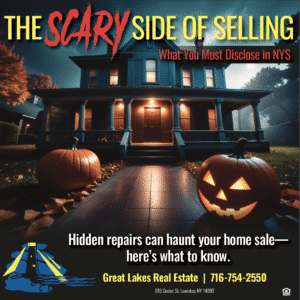The Scary Truth About Hidden Home Repairs: What New York Sellers Must Disclose

When you sell your home in Western New York, there’s one thing scarier than a haunted house—hidden repairs and undisclosed issues. New York State law has strict rules about what sellers must share with potential buyers, and failing to disclose certain conditions can turn your sale into a real-life nightmare.
What Sellers Are Required to Disclose in New York
In New York, the Property Condition Disclosure Act (PCDA) outlines what you, as a seller, must reveal about your home. While many sellers know the basics, a few often-overlooked details can come back to haunt you at closing.
Here are some key areas where honesty isn’t just the best policy—it’s the law:
- Structural and System Issues: You must disclose known problems with the roof, foundation, plumbing, electrical, or heating systems. If the basement leaks or the furnace is older than Frankenstein, it needs to be on the record.
- Lead-Based Paint (Pre-1978 Homes): Homes built before 1978 are subject to federal lead paint disclosure laws. Sellers must notify buyers of any known lead-based paint hazards and provide the required pamphlet, “Protect Your Family from Lead in Your Home.”
- Water and Septic Concerns: From well-water contamination to outdated septic systems, any issues affecting water quality or waste disposal must be disclosed. These can be costly to fix—and even scarier to hide.
- Flood Zones and Environmental Hazards: If your home sits in a designated flood zone, or near known environmental hazards, buyers must be informed. New York has strengthened these requirements in recent years, meaning sellers can’t just gloss over potential risks.
- Pests, Mold, or Asbestos: Termite damage, visible mold, or asbestos-containing materials must be shared with buyers. What seems like a “minor” issue can spook a deal fast if it comes up during inspection.
The Cost of Keeping Secrets
Some sellers assume they can skip the disclosure form by paying the $500 penalty allowed under New York law—but that can backfire and is no longer an option. Skipping disclosure doesn’t protect you from future liability. If a buyer later proves you knowingly hid an issue, you could face legal action, lost profits, or even a canceled sale.
The moral? Don’t treat the disclosure form like a trick. Full transparency can actually be a treat—it builds trust and speeds up closing.
How to Avoid Frightening Surprises
Selling a home doesn’t have to be scary. Follow these steps to protect yourself and your sale:
- Get a pre-listing inspection. Catch problems before buyers do.
- Fix what you can—or disclose it honestly. Hidden issues will always find a way out.
- Work with a knowledgeable real estate agent. A Great Lakes Real Estate professional can guide you through what needs to be disclosed under current state law and how to handle it properly.
- Stay organized. Keep documentation of repairs, permits, and inspections—it helps prove you’ve done things right.
Final Thoughts (and a Not-So-Scary Ending)
Selling your home should be exciting, not eerie. By understanding and following New York’s disclosure laws, you can avoid frightening surprises for both you and your buyer. Transparency builds confidence—and that’s the real magic behind a smooth sale.
If you’re thinking about selling your home this fall, contact Great Lakes Real Estate at (716) 754-2550. We’ll make sure your sale is anything but scary.



